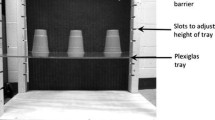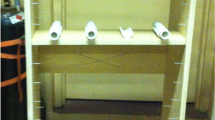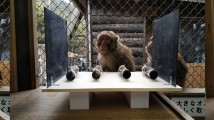Abstract
When confronted with uncertain or incomplete information in decision-making situations, monkeys and apes opt for either escaping the situation or seeking additional information. These responses have been interpreted as evidence of metacognitive abilities. However, this interpretation has been challenged. On the one hand, studies using the information-seeking paradigm have been criticized because subjects may simply engage in a search for information routine (e.g., search until spot the reward) without any metacognitive involvement. On the other hand, studies using the escape response paradigm have been criticized because subjects may not recognize their own state of uncertainty but have learned to use the escape response in the presence of certain stimuli configurations that create uncertainty. The current study attempted to address these two criticisms by presenting great apes (seven gorillas, eight chimpanzees, four bonobos, seven orangutans) with a seeking information task whose basic procedure consisted of presenting two hollow tubes, baiting one of them and letting subjects choose. Conditions varied depending on whether subjects had visual access to the baiting, the cost associated with seeking information, the time interval between baiting and choosing, the food quality and the additional information offered regarding the food’s location. Although subjects showed a high retrieval accuracy when they had witnessed the baiting, they were more likely to check inside the tube before choosing when high stakes were involved (Experiment 3) or after a longer period of time had elapsed between the baiting and the retrieval of the reward (Experiment 2). In contrast, providing subjects with indirect auditory information about the food’s location or increasing the cost of checking reduced checking before choosing (Experiment 1). Taken together, these findings suggest that subjects knew that they could be wrong when choosing.




Similar content being viewed by others
References
Barth J, Call J (2006) Tracking the displacement of objects: a series of tasks with Great apes and young children. J Exp Psychol Anim Behav Proc 32:239–252
Basile BM, Hampton RR, Suomi SJ, Murray EA (2009) An assessment of memory awareness in tufted capuchin monkeys (Cebus apella). Anim Cogn 12:169–180
Beran MJ, Smith JD, Coutinho MVC, Couchman JJ, Boomer J (2009) The psychological organization of ‘uncertainty’ responses and ‘middle’ responses: a dissociation in capuchin monkeys (Cebus apella). J Exp Psychol Anim Behav Proc 35:371–381
Bräuer J, Call J, Tomasello M (2004) Visual perspective taking in dogs (Canis familiaris) in the presence of barriers. Appl Anim Behav Sci 88:299–317
Call J (2004) Inferences about the location of food in the great apes (Pan paniscus, Pan troglodytes, Gorilla gorilla, Pongo pygmaeus). J Comp Psychol 118:232–241
Call J (2005) The self and the other: a missing link in comparative social cognition. In: Terrace HS, Metcalfe J (eds) The missing link in cognition: origins of self-reflective consciousness. Oxford University Press, New York, pp 321–341
Call J, Carpenter M (2001) Do chimpanzees and children know what they have seen? Anim Cogn 4:207–220
Carruthers P (2009) Meta-cognition in animals: a skeptical look. Mind Lang 23:58–89
Crystal JD, Foote AL (2009) Metacognition in animals. Comp Cogn Behav Rev 4:1–16
Foote AL, Crystal JD (2007) Metacognition in the rat. Curr Biol 17:551–555
Fujita K (2009) Metamemory in tufted capuchin monkeys (Cebus apella). Anim Cogn 12:575–585
Hampton RR (2001) Rhesus monkeys know when they remember. Proc Natl Acad Sci U S A 98:5359–5362
Hampton RR, Zivin A, Murray EA (2004) Rhesus monkeys (Macaca mulatta) discriminate between knowing and not knowing and collect information as needed before acting. Anim Cogn 7:239–254
Inman A, Shettleworth SJ (1999) Detecting metamemory in nonverbal subjects: a test with pigeons. J Exp Psychol Anim Behav Proc 25:389–395
Kornell N, Son L, Terrace H (2007) Transfer of metacognitive skills and hint seeking in monkeys. Psych Sci 18:64–71
Posada S, Colell M (2007) Another gorilla (Gorilla gorilla gorilla) recognizes himself in a mirror. Am J Primat 69:576–583
Smith JD (2009) The study of animal metacognition. Trends Cogn Sci 13:389–396
Smith JD, Schull J, Strote J, McGee K, Egnor R, Erb L (1995) The uncertain response in the bottlenosed dolphin (Tursiops truncatus). J Exper Psychol Gen 124:391–408
Smith JD, Shields WE, Schull J, Washburn DA (1997) The uncertain response in humans and animals. Cognition 62:75–97
Smith JD, Shields WE, Washburn DA (2003) The comparative psychology of uncertainty monitoring and metacognition. Behav Brain Sci 26:317–373
Smith JD, Beran MJ, Redford JS, Washburn DA (2006) Dissociating uncertainty states and reinforcement signals in the comparative study of metacognition. J Exp Psychol Gen 135:282–297
Smith JD, Redford JS, Beran MJ, Washburn DA (in press) Rhesus monkeys (Macaca mulatta) adaptively monitor uncertainty while multi-tasking. Anim Cogn 13 doi: 10.1007/s10071-009-0249-5
Staddon JER, Jozefowiez J, Cerutti D (2007) Metacognition: a problem not a process. PsyCrit 1–5
Suarez SD, Gallup GG (1981) Self-recognition in chimpanzees and orangutans, but not gorillas. J Hum Evol 10:175–188
Suda-King C (2008) Do orangutans (Pongo pygmaeus) know when they do not remember? Anim Cogn 11:21–42
Washburn DA, Smith JD, Shields WE (2006) Rhesus monkeys (Macaca mulatta) immediately generalize the uncertain response. J Exp Psychol Anim Behav Proc 32:85–89
Author information
Authors and Affiliations
Corresponding author
Rights and permissions
About this article
Cite this article
Call, J. Do apes know that they could be wrong?. Anim Cogn 13, 689–700 (2010). https://doi.org/10.1007/s10071-010-0317-x
Received:
Revised:
Accepted:
Published:
Issue Date:
DOI: https://doi.org/10.1007/s10071-010-0317-x




